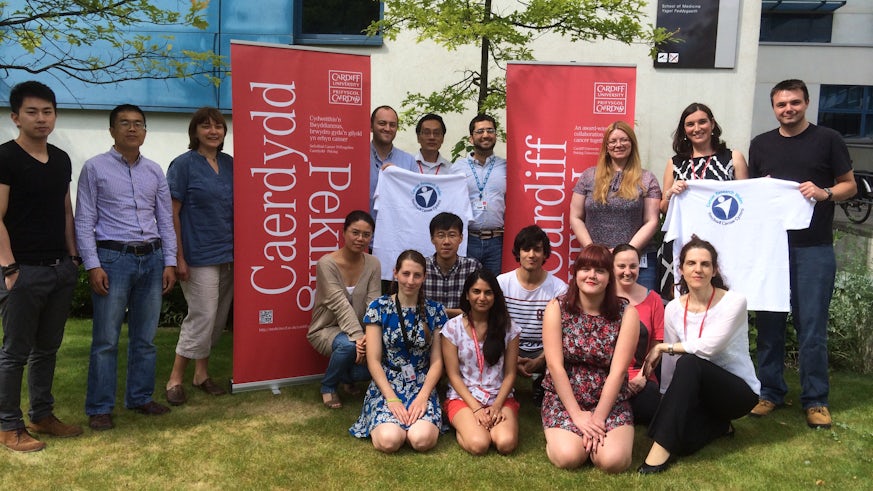A less toxic approach to beating cancer
18 November 2015

A cocktail of non-toxic chemicals taken from food and vegetables may hold the key to beating untreatable cancers and relapse
A cocktail of non-toxic doses of chemicals
taken from food and vegetables may be key to tackling untreatable cancers and
disease relapse, according to the findings of a global study jointly led by
Cardiff.
Despite a number of advances, many cancer therapies are highly toxic, and even
when they appear to work, a significant percentage of patients will experience
a relapse after only a few months.
Typically these relapses result from small subpopulations of mutated cells
which are resistant to therapy, and doctors who try to address this problem
with combinations of therapies find that therapeutic toxicity typically limits
their ability to stop most cancers.
To tackle this problem, a task
force of 180 scientists
from prominent
institutions in 22
countries, including Wales, was assembled by a Canadian NGO called “Getting to
Know Cancer”. Interdisciplinary teams nominated a series of
high-priority molecular targets (74 in total) that could be reached with
chemicals to improve patient outcomes in most cancers.
Corresponding low-toxicity chemical approaches were then recommended as
potential candidates for mixtures of chemicals that could reach a
broad-spectrum of priority targets in most cancer types. Their work is
described in a special issue of Elsevier’s ‘Seminars in Cancer Biology’,
published today.
Keith
I. Block, MD, the lead-author of the paper, who is the Medical and Scientific
Director of the Block Center for Integrative Cancer Treatment in Skokie,
Illinois, said: “We are extremely encouraged by the degree of
consensus that we found within this large group of researchers.
“We believe that carefully designed combinations of non-toxic chemicals can be
developed in a manner that will maximize our chance of arresting most
cancers. Currently, clinicians have a limited number of tools to help
them treat the disease once it becomes resistant to mainstream therapy, but an
approach that can reach a broad-spectrum of targets without toxicity offers
considerable promise.”
This was the first time that teams of researchers with such a wide range of
expertise have ever been assembled to address the complex problem of relapse.
The teams have emerged believing that carefully designed combinations of
non-toxic chemicals can be developed that will maximize our chances of
arresting most cancers.
A number of investigations on the low-toxicity chemicals were conducted by the
Cardiff University arm of the research, who led on one of its key themes:
cancer invasion and metastasis (spread).
Together with scientists from a number of other countries in North American,
Europe and the Far East, the team identified a series of phytochemicals that are
found naturally in plants which, when combined into a mixture, have the
potential to intervene in metastasis – the leading cause of cancer deaths.
For example, Cardiff’s China Medical Research Collaborative (CCMRC) teamed up
with Peking University, Capital Medical University and Yiling Medical Research
Institute of China to study the cancer-fighting properties of a herbal
medicine, known as YangZheng XiaoJi.They discovered that the medicine has the potential to intervene in cancer
metastasis by targeting the formation of new blood vessels that support tumour
growth, and a number of cellular signalling pathways in cancer that has not yet
spread.
Professor Wen Jiang, from Cardiff’s School of Medicine, said: “Traditional
Chinese Medicines are an interesting avenue for novel cancer therapies,
representing relatively low-toxicity and inexpensive formulations that have
been in use for centuries. Whilst research in cancer has progressed over
past years, research into compounds to prevent metastasis - a process
associated with poor patient prognosis - are relatively lacking.
“Our research on YangZheng XiaoJi has explored the efficacy of this formulation
in targeting aggressive pro-metastatic traits in a variety of human cancer
models. We found that YangZheng XioaJi could disrupt the ability of
cancer cells to adhere and migrate and interfere with a number of signalling
pathways associated with cancer progression.
“Additionally, this formulation was shown to interfere with the process through
which cancer cells encourage new blood vessel formation to obtain nutrients
necessary to sustain their development. Hence, this may represent a low
toxicity formulation capable of targeting multiple aspects of cancer
progression.”
Whilst the molecular basis of the medicine is further investigated, a number of
clinical trials are now ongoing in China in patients who suffer from lung,
liver, and gastric cancers.
In light of this evidence, the task force is calling for an immediate increase
in support for research on mixtures of chemicals that can reach a
broad-spectrum of therapeutic targets. There are still many unanswered
questions so animal trials are now needed to advance this approach before human
trials are possible.
“This is an area that merits considerable attention,” said Dean Felsher MD
PhD, another team leader on the taskforce, from the Department of Medicine at
Stanford University. “Our approaches to therapy are improving, but we
need a breakthrough that can help us address the problem of relapse, and this
is a new, paradigm-changing approach that might just give us a chance”, he
added.
The taskforce also want to produce an approach to therapy that would have the
potential to be very low cost, because many of the latest cancer therapies are
deemed unaffordable in low-to-middle income countries.
Accordingly, the task force has laid the groundwork for a solution that should
be both inexpensive and effective in making this novel approach available to
people throughout the world who are suffering from cancer.